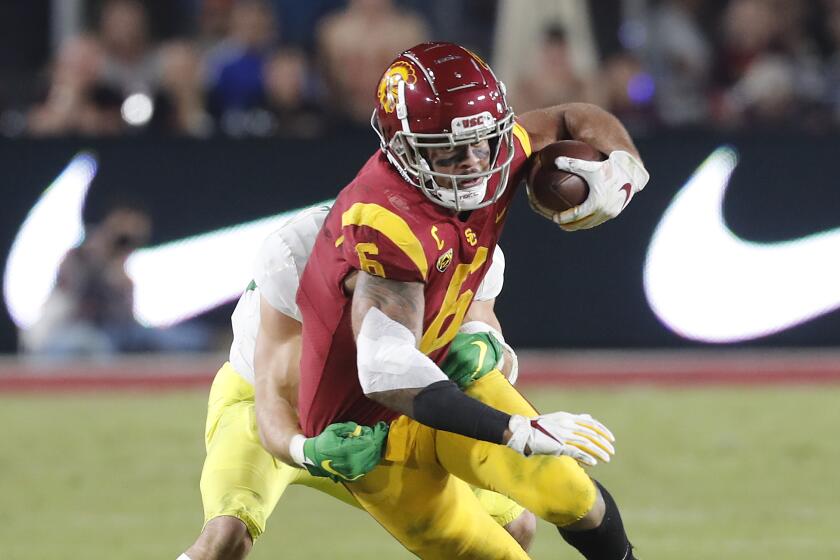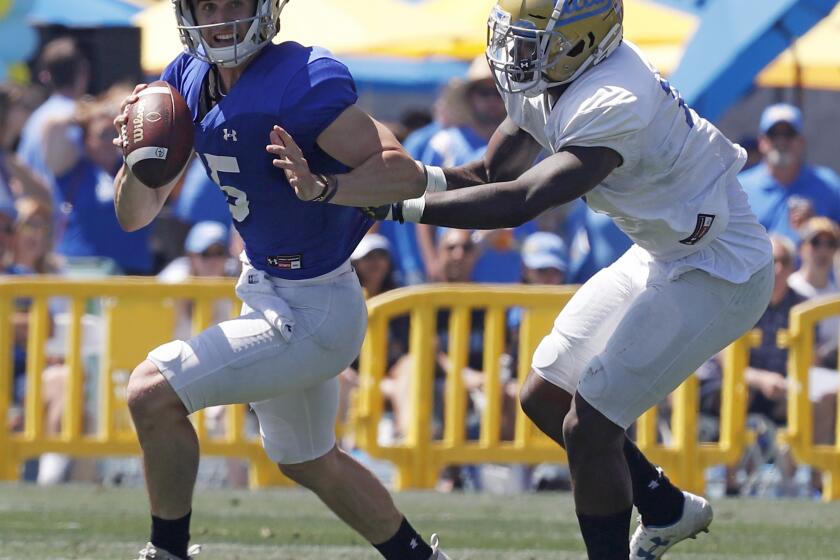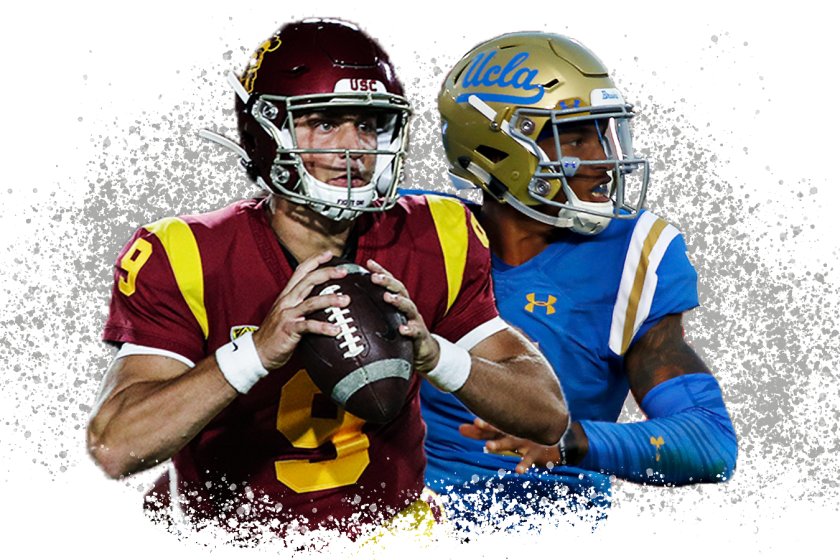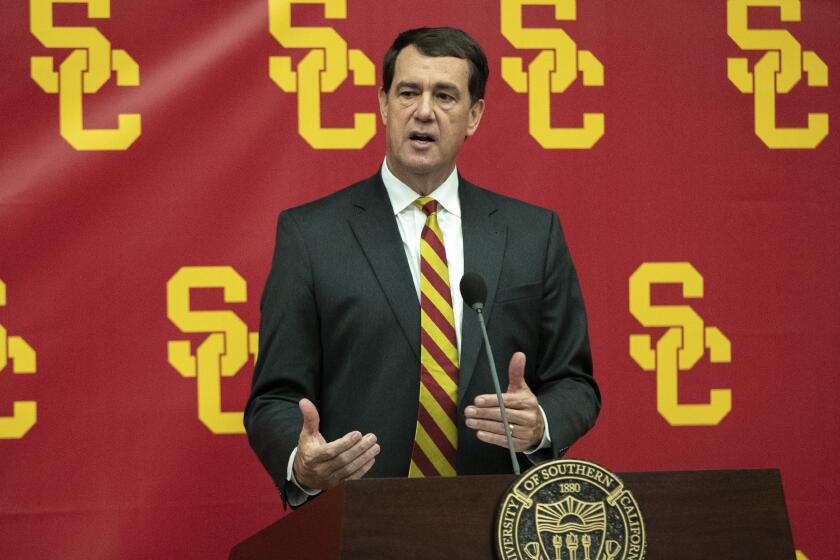For USC’s football program, integrity issue could be key to any move
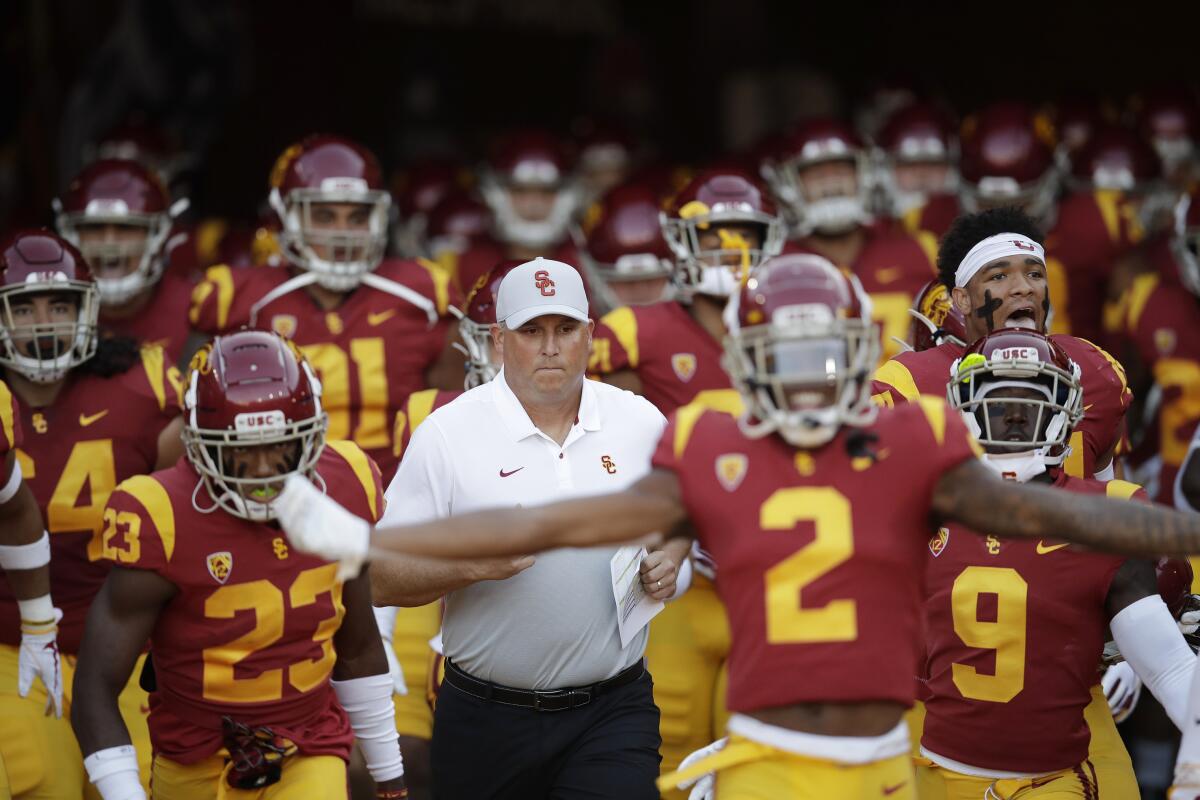
At a reception this month, donors and university leaders comprising USC’s many boards of counselors gathered at the Town and Gown ballroom on campus for an opportunity to meet and mingle with new university President Carol L. Folt.
In two days, Folt would introduce Mike Bohn as athletic director, ushering in a new era of “excellence with integrity” for USC athletics.
But as bureaucracy delayed Bohn’s hiring, anxious speculation over the future of USC’s football program was simultaneously mounting. At the crux of that chatter was Folt, her perception of integrity, and how a certain national title-winning coach followed by character concerns might — or might not — fit within that definition.
After finishing her remarks, Folt opened the floor for questions. The first, from a faculty member seated at a front table, was about football.
Ralph Allman, who serves on the athletics board of counselors, wore a pin from USC’s last national championship on his lapel as he waxed poetic about the Pete Carroll days, reiterating the importance of a winning football program for the rest of the university. He raised his hand out of concern about rumors he’d heard of Folt placing limitations on a coaching search, in the event USC decided to move on from Clay Helton.
When USC and UCLA play at the Coliseum on Saturday, there won’t be many NFL scouts there to observe the draft-eligible players for both teams.
So Allman asked what disenchanted fans and prominent boosters alike had come to wonder in recent days: “I said to her, ‘Are we going to be open-minded and objective about our coaching choice?’ ”
He didn’t use any names. But the subtext of his question was clear.
“I was addressing Urban Meyer,” Allman later told The Times. “Everyone knew that.”
Meyer has long been a source of message-board hysteria for disaffected USC fans, many of whom have come to view the former Ohio State and Florida frontman as the sole coach capable of returning their program to prominence.
But character concerns from coaching stops at Florida and Ohio State have raised questions not only about Meyer’s past, but what Folt, tasked with repairing the tarnished reputation of a university, might be willing to accept in the name of on-field success.
“Whoever it is,” Folt told him, “will have impeccable integrity.”
Her answer was meant generally; her office reiterated later that it was not intended as a “commentary on Clay or anyone else.” Still, hours later, in the Founders Room at Galen Center, many of the athletic boosters who’d attended were abuzz about it, anyway. They mused about what she might have meant, concocting theories and wondering aloud if it might actually be a direct referendum on Meyer.
The student newspapers at UCLA and USC are collaborating on an all-football preview issue ahead of the game between the Bruins and Trojans on Saturday.
But Folt has largely been consistent on the subject of integrity. Her emphasis was no different at North Carolina, where, as chancellor, she inherited a wide-reaching academic scandal with ties to athletics. She commissioned an independent investigation into the university’s own misgivings and took on the fallout, instituting 70 reforms in response.
It was that experience that convinced USC’s board of trustees Folt was capable of returning integrity to an institution in turmoil.
“Any time you have any scandal that goes on, the reality is that there’s unfortunate damage that’s done to its reputation,” said Rick Caruso, board chairman and billionaire developer. “We need to be wide-eyed about it, clear-eyed, and deal with it head-on, and get to the business of fixing it. That’s what Carol is focused on.”
The Times spoke with five administrators who worked closely with Folt during her six years as chancellor at North Carolina. Each described her as a leader unwilling to compromise when it came to integrity, one who was always guiding the administration toward what she called its “true north.”
“Personal integrity, that’s what she values most,” said Bubba Cunningham, North Carolina’s athletic director. “Get somebody that’s gonna do what they say they’re gonna do, and do it with the utmost integrity.”
One administrator who worked closely with Folt at North Carolina said there was “not a snowball’s chance in hell she’d hire a coach with integrity problems.”
Last month, in a phone interview prior to Bohn’s hiring, Folt was asked about the significance of integrity in her search for USC’s athletic director. She was similarly unequivocal.
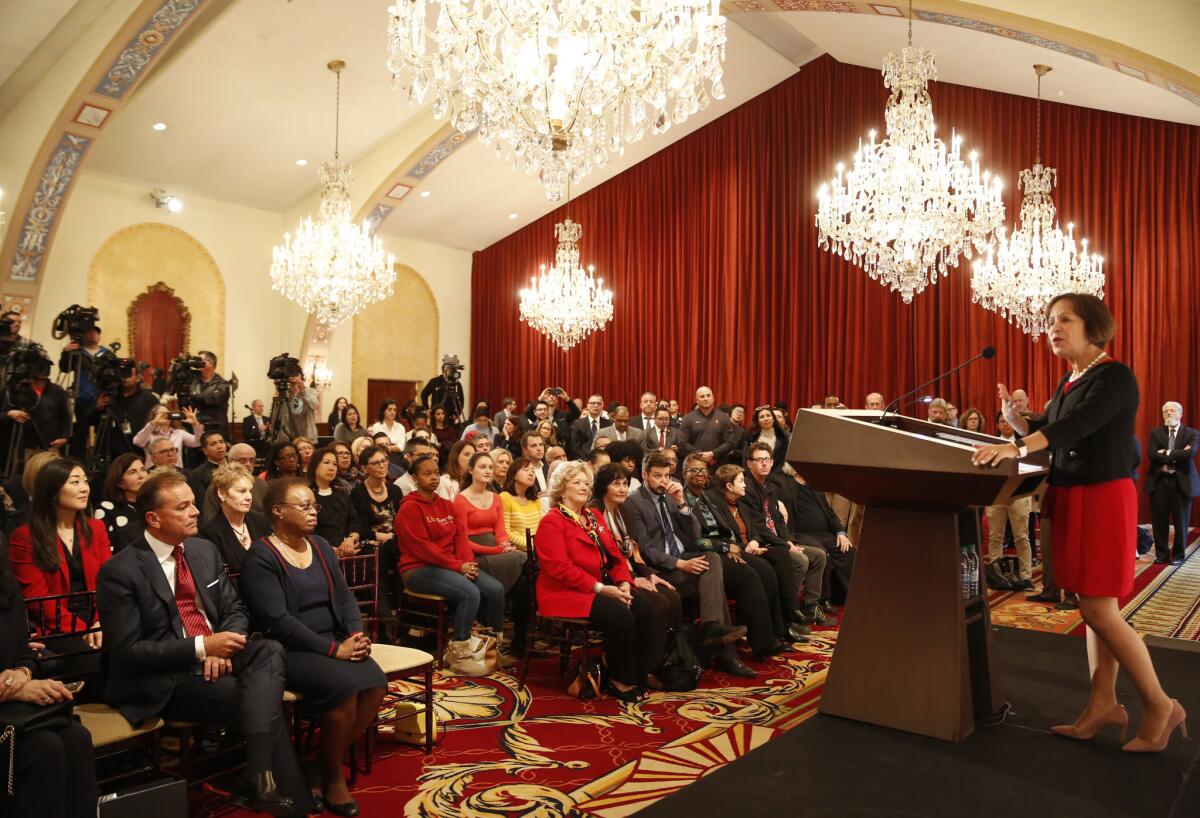
“You can’t run a program if you don’t have integrity,” she said. “We face things in our careers that really are the makings of who we are, and that’s what I’m looking for, someone that has really shown that integrity is really the most important feature.”
But as Folt brings integrity to the forefront of the conversation at USC, it’s fair to wonder in an era of constant debate over ethical nuance, just how those moral determinations are made — not only at USC, but throughout college football.
Where should the line be drawn? And who should draw it? When it comes to college football, where coaches wield tremendous power over resources and significant influence over unpaid, impressionable student-athletes, integrity is not always so easily defined.
“It’s an intangible characteristic, but it’s also tangible,” Folt said. “You look at people’s history. What have they done in the past? How have they dealt with problems? I think it’s a kind of thing where you have to sit in a room and talk about things and get a real feel for a person.”
But what about when that history is unclear? What about when lines of perception blur?
At USC, integrity has often been used as a vague, moral catch-all for lip service, in order to signal return of long-lost luster in athletics.
When Pat Haden was hired as athletic director in 2010 to steer the program through crippling NCAA sanctions, he was heralded by then-president C.L. Max Nikias as a beacon of integrity in a dark era for athletics. The affable former quarterback vowed upon his arrival to create “a culture of compliance” and to “win the right way”.
Just a year later, under Haden’s watch, machinations of the Varsity Blues admissions scandal were set into motion.
“I imagine that most ADs or presidents, when they say those things, they believe them,” said Shawn Klein, a sports ethics professor at Arizona State. “I think they’re sincere. But I think usually it’s more aspirational than anything. It’s where they want to go, but as things set in, there are other counter-balancing factors. Winning is not unimportant. It’s important for the reputation of the university.”
But, Klein continued, “there’s a lot of room for rational disagreement about where that bar should be.”
Certain unforgivable transgressions, like those at Baylor, Penn State, and Michigan State, present an obvious line in the sand. But moral clarity in college football is hardly ever so cut-and-dry.
When UCLA athletic director Dan Guerrero introduced Chip Kelly as the Bruins’ new football coach in November 2017, there was minimal hand-wringing over the fact that four years earlier Kelly had been banned by the NCAA for 18 months.
During Kelly’s final year at Oregon, the NCAA discovered a $25,000 payment to a recruiting service with ties to prospects the Ducks were recruiting. The program received probation, but its coach, already gone for the NFL, never faced any consequences.
Kelly was explicitly caught in violation of NCAA rules. But when Guerrero spoke of his new coach at the opening news conference, he noted that Kelly “understands that integrity is at the heart of everything we do here.”
Perhaps no coach in college football more adequately captures this ethical quandary than Meyer, who, unlike Kelly, has never been charged with a major violation by the NCAA, but who has left a trail of integrity questions in his wake since taking over at Florida in 2005.
In Gainesville, he was criticized for fostering a culture that allowed for 31 arrests of football players during his tenure. At Ohio State, an investigation revealed that Meyer had protected assistant coach Zach Smith, whose wife had accused him on numerous occasions of domestic assault, once while she was pregnant. Meyer, who continued to employ Smith until 2018, then lied about the 2015 allegation, before clearly attempting to cover up his transgressions. He was suspended for three games.
So does that past preclude Meyer from moving forward as a college football coach? That’s the question that continues to loom over a USC fan base reckoning with its recent fall from relevance and a near-desperate desire to return to the place it once occupied atop college football.
While the new athletic director has hurried to ingratiate himself with the university, Mike Bohn told The Times in an interview that there’s no such rush to make a decision on the status of embattled football coach Clay Helton.
In Meyer, whose winning percentage (.854) towers over every other active college coach, some see an immediate solution to that problem, one that outweighs any potential fallout.
Many USC athletic boosters have indicated they’re willing to accept those missteps for a shot at Meyer. Allman explained he didn’t “think they’re that big of an issue, to be honest with you.”
“I just feel like the strength of Urban Meyer’s background far exceeds some of these indiscretions,” Allman said. He’s not alone in that sentiment.
Where Folt and Bohn actually stand remains to be seen. There are no indications that either has even considered Meyer as a possible coaching candidate, though rumors persist that Folt’s insistence on maintaining integrity make any pursuit unlikely. Both surely understand the questions that would await if they did pursue Meyer.
For at least one more game, though, as USC continues on with a head coach whose sincerity has long been his calling card, that problem remains a hypothetical. Since taking over for a man who was fired after appearing intoxicated at a university event, Helton’s integrity has never been questioned.
But with the end of its season fast approaching and a decision looming on the future of its football program, as both consider the totality of Helton’s tenure and the moral uncertainty that might await outside of it, both Folt and Bohn will be faced with a difficult question: Is that enough?
More to Read
Go beyond the scoreboard
Get the latest on L.A.'s teams in the daily Sports Report newsletter.
You may occasionally receive promotional content from the Los Angeles Times.

